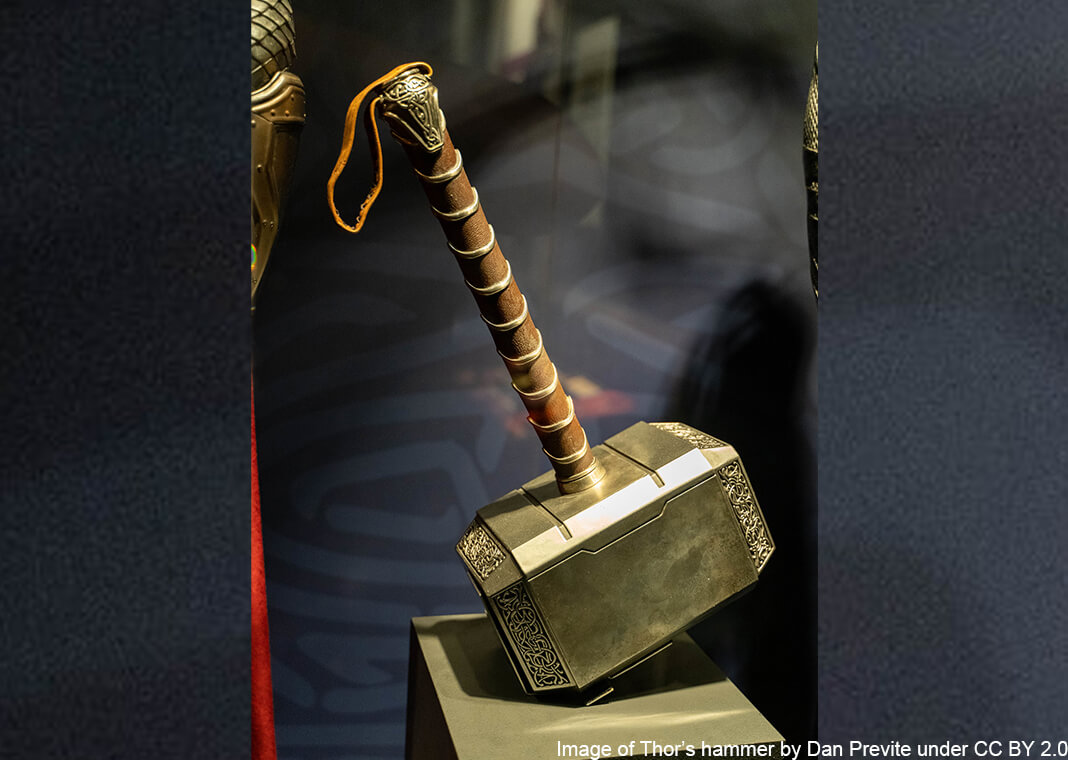
It’s easy to forget that Thor is a god.
I was reminded of this recently watching the latest installment in the Thor franchise—a crucial piece of the larger Marvel Cinematic Universe (MCU)—Thor: Love and Thunder.
The titular character is played by Chris Hemsworth and has been since the original 2011 film. That film involved all sorts of gods and godly powers, setting up a clear juxtaposition between Asgard—the home of the gods—and Midgard, otherwise known as Earth.
But when Thor joined the Avengers the following year in a film of the same name, he became just one more superhero. Powerful, yes, but for some reason unable to vanquish evil without the help of a guy armed only with a shield, another guy decked out in a robot suit, and their handful of moderately super friends.
In the decade since the Avengers first assembled on the big screen, Thor has been on a number of quests—some solo, but most with one or more fellow Avengers in tow. Even as he does things straight out of Norse mythology, he still feels like one more super-powered superhero.
I’m no Marvel expert. I’m strictly a movie and television fan with very little knowledge of the long and storied legacy of the comics. As such, I’m left to wonder: What is a god in the Marvel universe?
There seems to be no end to the number of ultra-mythic creatures on the loose, supercharged baddies with doomsday-level weaponry, and mysterious antagonists still to be fully explained. (I’m looking at you, Eternals.)
But at the end of the day, these characters remain bound by parameters, able to be outsmarted and defeated, no matter how great the multiverse. They are fully knowable—at least, in the fullness of time that is the MCU’s content calendar.
Russell Crowe’s Zeus says it nicely in a post-credit scene from Love and Thunder: “It used to be that being a god meant something.” He laments that humans—and, presumably, the rest of the critters roaming the multiverse—no longer pray to the gods for a good harvest or rainfall. “Now they look to the sky…[and] just want to see one of their so-called superheroes.”
And then, undoubtedly to set up another few rounds of films, he mutters, “When did we become a joke? They will fear us again.”
Our God, in the Christian tradition, stands in stark contrast. God is unknowable, unconcerned with defeat, and uninterested in instilling fear. Yet too often we create god in our image and likeness—and too often, we wish our image and likeness were that of a superhero.
It’s easier to picture Jesus in a cape, whooshing about to defeat the baddies. St. Ignatius himself often encourages us to picture Christ as a king on a battlefield, waging eternal war with the forces of evil. This image, though useful to a degree, has permeated our religious imagination; we too often are tempted to imagine ourselves as foot soldiers for Christ, dealing out violent retribution to those that dare cross us and our holy charge.
Much like the gods of the MCU, we want our god to summon us to battle and to bless our desire to hammer those things and people we deem bad to oblivion. We’d rather a god who runs on our fear, because fear is a tool of violence and a mechanism that justifies nearly anything.
Boundless fear is easier than boundless love.
We want a god who is a projection of ourselves.
But the God we have is not that. The God we have is wholly other, wholly unknowable yet entirely intimate, present and caught up in our affairs. Ours is a God who does not plot revenge but openly spreads hands of hospitability and humility, the Father to our Prodigal Son.
Ours is a God who desires not our fear but only our love—our love for self, for neighbor, and for creation. Our God is not bound by the supposed multiverse but transcends it, every fiber of creation pulsing with that Divine spark, calling us to love more deeply.
Image of Thor’s hammer by Dan Previte under CC BY 2.0.

Nice article comparing god and marvel. I am a great fan of marvel. I don’t think we can compare god with avengers or Marvel super hero’s. God is superior than anything in the universe. God is pure love, desire less and cant be defined in words.
Great article! My husband is a comic book fan & learned of right and wrong thru that lens! He gives me a sense of perspective and the right thing to do that maybe challenging or difficult at times which I think we’re all called to discern in any given moment.
Love the article!
God is Truth writes Mahatma Gandhi. And Truth is always the winner. If Truth resides in our thought, word, and deed, we are likely to be on firm ground.
Perhaps the last two paragraphs should have been the first two paragraphs to help the reader better understand your point.
One positive reference to Ignatian spirituality would have been instructive to the reader.
This reads more like a movie review for comic book enthusiasts. 15 paragraphs about comic book and movie characters with 2 devoted to” our God.”
I thank God for the witness here…that the Divine spark is planted within each person…God intends for each of us to embrace our deepest desires and the creative expression of them. A gift of magnanimous love…spilling out in a blog.